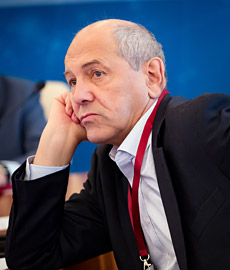
Electronic english version since 2022 |
The newspaper was founded in November 1957
| |
After the departed
 In memory of outstanding scientist
In memory of outstanding scientist
On 19 October, Academician Valery Anatolievich Rubakov passed away at the age of 67. He was an outstanding scientist, one of the world’s leading experts in the fields of quantum field theory, elementary particle physics, and cosmology.
V.A.Rubakov was born in Moscow in 1955. He graduated from the Faculty of Physics of Moscow State University in 1978 by defending his thesis at the Department of N.N.Bogoliubov, from which many talented theoretical scientists graduated. After the University, he entered postgraduate courses at the Institute for Nuclear Research of the USSR Academy of Sciences (INR).
In 1981, under the guidance of N.V.Krasnikov and A.N.Tavkhelidze, he defended a Candidate’s dissertation “Structure of vacuum in gauge models of quantum field theory” and became a junior researcher at the Department of Theoretical Physics of INR, at which he worked until now. He defended his Doctoral dissertation (1989) there and worked his way up to a chief researcher (1994), a full member of the Russian Academy of Sciences (1997).
V.A.Rubakov was the author of more than 160 scientific papers, many of which made fundamental contributions to the theory of the early Universe, non-perturbative quantum field theory, formation theory of baryon asymmetry of the Universe, quantum gravity. His scientific style perfectly combined a deep insight into the essence of physical phenomena, which allowed qualitatively understanding and explaining them, and a detailed quantitative analysis of the most important phenomenological effects.
V.A.Rubakov stood at the origins of the modern inflationary theory. He was the first one to realise that studying the Universe today and understood its development history could make it possible to learn new things about physics of high energy particles that are not available to direct experimental observation yet.
For his fruitful scientific work, A.Rubakov received a number of prestigious scientific awards, including the ITEP Pomeranchuk International Prize in 2003, the INR Markov Prize (2005), the Bruno Pontecorvo International Prize (2009), Mikhail Lomonosov Award (2012), the Bogoliubov Prize (2014), the Demidov Prize (2016). In 1990, he was elected a corresponding member of the USSR Academy of Sciences. In 1997, he became a full member of RAS. He was Deputy Academician Secretary and Head of the Nuclear Physics Section of the RAS Department of Physical Sciences.
He was well-known in the scientific world as an attentive and demanding educator. Under his guidance, many Candidate’s dissertations were defended. Developing the scientific school of N.N.Bogoliubov, A.N.Tavkhelidze, V.A.Matveev, having trained many students, V.A.Rubakov created his own scientific school on theoretical physics recognised worldwide.
From 1987 to 1994, Valery Anatolievich held the post of Deputy Director for Science of the RAS Institute for Nuclear Research. Afterwards, he became a chief researcher of INR. He headed the Department of Particle Physics and Cosmology of the MSU Faculty of Physics. As Deputy Director, he was responsible for the astrophysical field of the Institute’s activities, including the construction and operation of the INR Baksan Neutrino Observatory, the Baikal Deep Underwater Muon and Neutrino Detector. This period was marked with significant successes. In particular, the construction of the Gallium-germanium neutrino telescope was concluded at the Baksan Neutrino Observatory. It allowed obtaining fundamental results on measuring the flux of solar neutrinos.
Having a high international reputation, V.A.Rubakov tirelessly promoted the achievements of Russian science, the expansion of contacts between Russian scientists and their foreign colleagues. He actively participated in the activities of Russian and international organizations supporting the development of Russian science. He had deep scientific and friendly contacts with colleagues in Dubna, where he often came to continue joint activities and participate in the work of the JINR Scientific Council, an authoritative and respected member of which he had been for several recent years.
The JINR Directorate and the international staff of the Institute, colleagues and friends deeply mourn his untimely loss and express their sincere condolences to the family and friends. The bright memory of the great scientist will remain forever in our hearts.